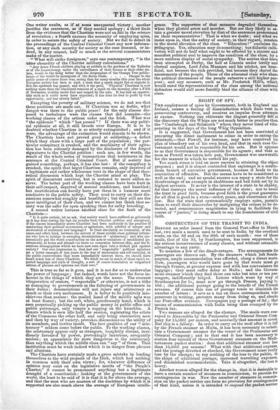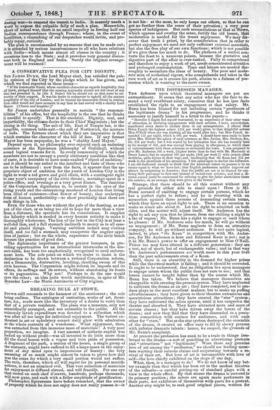OBSTRUCTION OF THE TRANSIT TO INDIA.
BEFORE an order issued from the General Post-office in March last, two mails a month used to be sent to India by the overland route, on the 3d and on the 20th of each month : one of those mails, that of the 3d, by Southampton, has been suppressed, to the serious inconvenience of many classes, and without ostensible advantage to any party.
To mention a few of the disadvantages. The arrangements for passengers are thrown out. By the steamers which left South- ampton, ample accommodation was afforded, along a direct route. Now, passengers who would have gone by that routemust go through France, at greater expense and with less convenience for luggage; they must suffer delay at Malta ; and the Govern- ment steamer which they find there can take but nine or ten pas- sengers, indifferently lodged. Letters which went by way of Southampton for is., must now go through France, paying Is. 10d.; the additional postage going to the benefit of the French revenue. Of course this rise of postage tends to diminish the number of letters : it acts as a tax on those correspondents who persevere in writing, prevents many from doing so, and checks our Post-office revenue. Newspapers pay a postage of 3d.; that means of communication with India being thus cramped by the French tax.
Two reasons are alleged for the change. The mails were con- veyed to Alexandria by the Peninsular and Oriental Steam Com- pany for 15,500/, per annum, and nominally that amount is saved. But this is a fallacy. In order to carry on the mail after it is left by the French steamer at Malta, it has been necessary to substi- tute a Government steamer for the vessel of the Peninsular and Oriental Company ; and to that end it has been necessary to station four instead of three Government steamers on the Medi- terranean packet station : does that additional steamer cost less than 15,500/. per annum? What with that additional expense, and the postage diverted or checked, the Government must really lose by the change; to say nothing of the loss to the public, ill the shape of additional postage, increased travelling expenses, and diminished accommodation. Take it altogether, the loss is heavy.
Another reason alleged for the change is, that it is desirable to have a certain number of steamers in commission, to provide for contingencies in war. Now the number of steamers in commis- sion on the packet service can form no provision for contingencies of that kind, unless it is intended to suspend the packet service during war—to suspend the transit to India. It scarcely needs a word to expose the culpable folly of such a plan. Meanwhile, short of actual war, there is no small impolicy in forcing half our Indian correspondence through France ; where in the event of hostilities, a ransacking of our despatches would invite, and pro- bably repay, curiosity. The plan is recommended by no reasons that can be made out; it is attended by serious inconveniences to all who have relations with India—which means almost all classes in the country ; it occasions loss to the State ; and it provokes very general discon- tent both in England and India. Surely the original arrange- ment will be resumed ?



























 Previous page
Previous page